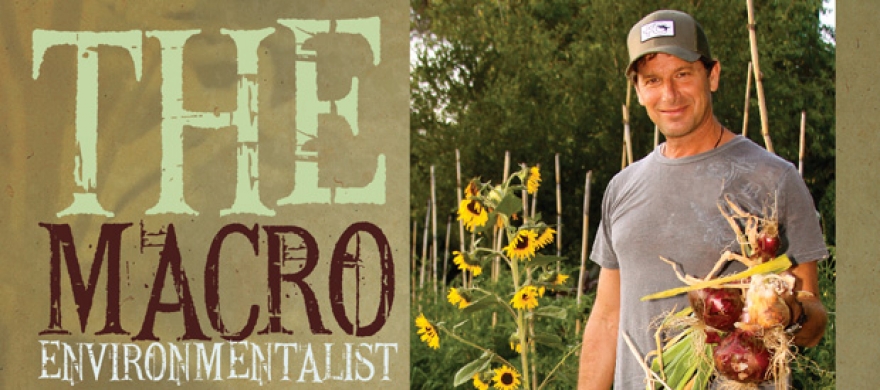The Macro Environmentalist
Long-time conservationist Michael Crooke inspires CEOs of tomorrow in the Graziadio Schools SEER program.
With public trust in big business on the decline, Fortune 100 company boardrooms are buzzingp about corporate social responsibility (CSR) and its benefits to the public sphere. At its core, CSR favors the triple bottom line model, which prioritizes the macro-values of people, planet, and profit. While companies are applying the ethics-based principles in their strategies to improve quality and revenue, veteran environmentalist and eco-entrepreneur Michael Crooke has elevated the philosophy in Pepperdine classrooms.
The former president and CEO of Patagonia outdoor apparel company joined the University in 2010 as the Distinguished Visiting Professor of Business Practice at the Graziadio School of Business and Management, where he launched a comprehensive certificate program in Socially, Environmentally, and Ethically Responsible (SEER) Business Practice. The program, made available to full-time MBA students last fall, seeks to transform the corporate landscape by introducing a new approach to integrating conservationism, authentic green marketing, environmental stewardship, social enterprise, corporate citizenship, and social entrepreneurship into the mainstream.
“Ultimately, the grand businesses of the 21st century will be those that subscribe to a SEER-type model,” explains Crooke, now assistant professor of strategy. “Teaching MBA students—future CEOs—seems like the right place for me to be at just the right time.”
Inspired by Patagonia founder Yvon Chouinard, Crooke wrote his doctoral dissertation using research on the SEER model to examine the role of values in high-performance organizations as witnessed during his 15-year career as CEO at numerous companies. Among its endeavors, the SEER model promotes the integration of a sustainability ethic into all business practices.
“A great service or product in my point of view stipulates that a business must look at the environmental aspects of the product itself,” asserts Crooke, who earned his PhD in management from Claremont Graduate University in 2008. “Both the environmental and social components are critical: you need to understand your supply chain and if there are questionable labor procedures involved. You also need to know if there is waste involved in the supply chain. Those are not only the concerns of a social point of view, but a brand point of view.”
Critics of the SEER philosophy argue that stricter government regulation is necessary to check companies that promote CSR, and such businesses are urged to be honest in revealing both their ethical and unethical practices. “Companies that choose to speak publicly about making decisions with a SEER perspective must remember that authenticity and transparency are the key elements of the emotional connection a brand can forge with its customers using this type of strategy,” says Crooke. “If a nongovernmental organization (NGO) discovers inconsistencies in a company’s procedures, it will devastate the brand. Nike found that out the hard way in the ’80s. Now they are one of the most transparent companies on the planet.”
Emphasizing the importance of quality among CSR’s three macro-values of people, planet, and profit, Crooke adds, “Starting with a great product or service encourages a company’s long-term, financially secure success. Without a product that wins in the marketplace the experiment is over.” Thus the SEER model encourages a complete mindset focused on embedding these four macro-values into the company culture instead of only integrating green initiatives into a company’s mission.
Throughout his decades-long career as a socially responsible businessperson, Crooke has become a pioneer in sustainable corporate practices, implementing initiatives that have revolutionized the eco-friendly apparel industry. One such initiative was a collaborative effort between Crooke and Chouinard to brand Patagonia’s longtime commitment to pledge one percent of annual sales to environmental organizations worldwide. Today, “1% for the Planet” has become an alliance of over 1,500 companies that have adopted the program and collectively given away $20 million to grassroots foundations.
At Patagonia, Crooke parlayed the SEER message by mobilizing the “Common Threads Recycling Program,” which encouraged customers to return their worn Capilene base-layer clothing to the company to be recycled and remanufactured into new products. This initiative significantly reduced inventory cost and use of petroleum-based products to make fibers. “Even if a person does not subscribe to global warming, he or she must still look at what goes into their product and strive to eliminate as much waste as possible,” he argues.
Crooke’s dedication to the environment has been a lifelong investment beginning as a child growing up in the diverse landscape of Aloha, Oregon. Surrounded by unspoiled nature of the northwest in the family garden and watching spawning salmon fill the creeks during Boy Scouts campouts, Crooke became an outdoor aficionado, later joining the Navy SEALs and earning a BS degree in forestry from Humboldt State University.
Working in the woods of Oregon, he could have never imagined that the activities to which he devoted so much time could be done in the scope of a career. “You can embed your values in any organization,” he reveals. “That was a powerful lesson that brought it all together for me. Now, I use the SEER model in every aspect of my life. If it’s not able to be part of whatever I’m doing, then I don’t do it. That’s my screen.”
